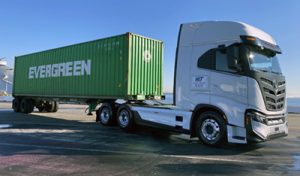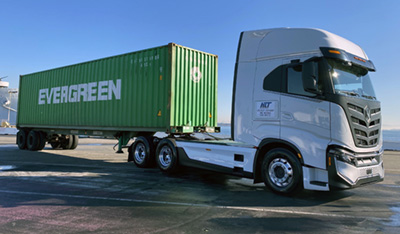
Battery-electric vehicle (BEV) pilot trucks have been delivered to local trucking firm Total Transportation Services, Inc. by Nikola Motor Co., furthering efforts to bring a zero-emissions fleet to the ports of Los Angeles and Long Beach.
“Nikola committed to make its first Tre BEV deliveries in Q4 2021 and it is a big honor to celebrate this milestone with our partner, TTSI and dignitaries who are committed to advancing zero-emission transportation solutions to reduce truck emissions in port operations,” said Nikola CEO Mark Russell. “TTSI has significant sustainability goals, and we are pleased to help them achieve their vision.”
About 13,000 to 14,000 trucks call at the ports of Los Angeles and Long Beach in a given month, according to TTSI, creating about 2,600 annual tons of nitrogen-oxide emissions.
In May, Nikola and TTSI announced its partnership to order and test 100 zero-emission trucks, starting with a pilot of two BEVs and two fuel cel electric vehicles, or FCEVs. The Nikola Tre BEV is created to make hauls up to 350 miles, while the Nikola Tre FCEV truck is designed to deliver cargo as far as 500 miles away.
Nikola has said that if trials are successful and TTSI is able to get government funding for the project, it plans to deliver 30 BEVs in 2022, and 70 FCEVs in 2023.
“Reaching a zero-emission transportation future requires bold leadership and collaboration from federal, state, and local partners, along with major investments from the private sector,” Congresswoman Nanette Diaz Barragán said. “This is crucial for the health of people living in the communities near the ports in my district, who suffer higher rates of cancer, asthma and other respiratory diseases due to all the toxic diesel emissions coming from the equipment and trucks at the ports.”

